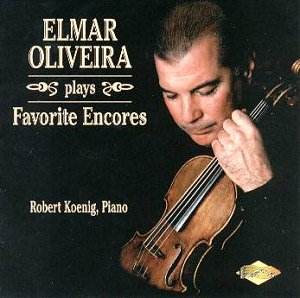It takes a violinist of adept and adaptable stylistic
affinities to offer homage to his violinistic forebears. In his own
notes Oliveira reveals that all the pieces here are connected in some
way with certain players in his memory Ė Michael Rabin, Heifetz, Milstein
and Kreisler. Oliveira is one of the foremost violinists in America
now playing and also one of the less well known. His success with the
Barber Concerto did not propel him to the ranks of the leading international
soloists Ė but itís clear that he is a musician of powerful gifts and
broad sympathies. He has an elegant tone, focused, controlled but well
varied and a strong colouristic sense and some (not overused) inflective
devices Ė such as emotive finger position changes Ė through which he
can give richly nuanced and textured life to the music. His right hand
is strong Ė with fluent and fluid bowing. To all this he brings a strong
profile and here evokes but never imitates his violin heroes so closely
identified in his mind with these works.
The recital begins with the Massenet. Itís stylistically
apposite with some expressive shading but is also rather over-projected.
My problem relates to the sound and Iím not entirely sure whether this
is Oliveiraís fault or the responsibility of the engineers or a combination
Ė but he never seems to play quietly enough. The result is that the
more quiescent pieces emerge rather beefier than they should. Oliveira
can be a commanding and virile tonalist but heís capable of relaxing,
as he shows here, so Iíd be hesitant to apportion responsibility; the
fact remains that much of the quiet playing sounds too loud. His Gershwin-Heifetz
Porgy and Bess is splendid, the colour and vibrant bite of My
Manís Gone Now probably the highlight even though he lacks Heifetzís
razor sharp responses in Bess, You Is My Woman Now. No arguments
however with the dare-devilry of It Ainít Necessarily So. To
paraphrase the old Prime Ministerís Questions, in the case of Rachmaninovís
Vocalise I refer you to the comments I made in respect of Massenet
Ė only more so. Achronís Melody scores well for idiomatic sensitivity
Ė though this is not the molten Elman approach Ė but Kreislerís Liebesfreud,
whilst not slow doesnít sound optimally phrased and, ironically, sounds
too slow. The little Herbert trifles are nice to have but donít make
much of an impression. His de Falla, however, registers strongly Ė and
reaches real heights with the Jota and Asturiana where
he plays with impressive sweep and allure.
For reasons already stated this recital gets a somewhat
mixed recommendation but I should add that when Oliveira is on top form,
which is often, and especially in de Falla, he is a dazzling and magnetic
performer.
Jonathan Woolf

